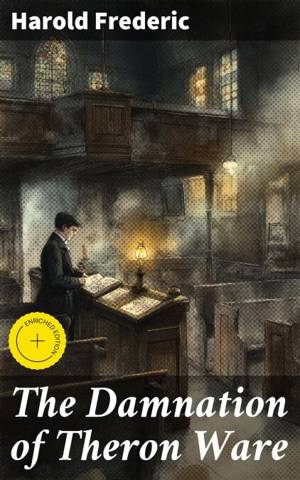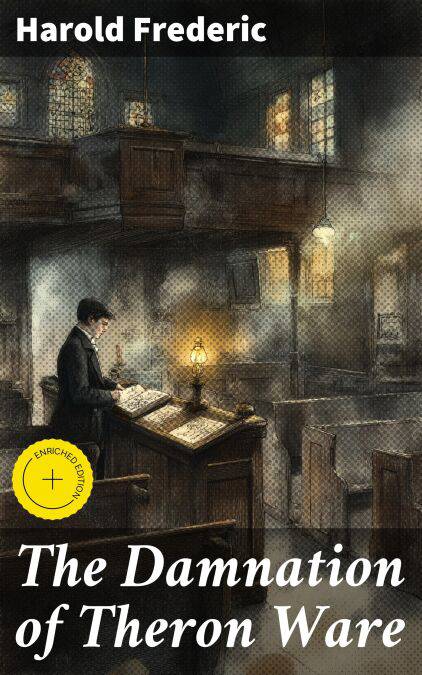
Je cadeautjes zeker op tijd in huis hebben voor de feestdagen? Kom langs in onze winkels en vind het perfecte geschenk!
- Afhalen na 1 uur in een winkel met voorraad
- Gratis thuislevering in België vanaf € 30
- Ruim aanbod met 7 miljoen producten
Je cadeautjes zeker op tijd in huis hebben voor de feestdagen? Kom langs in onze winkels en vind het perfecte geschenk!
- Afhalen na 1 uur in een winkel met voorraad
- Gratis thuislevering in België vanaf € 30
- Ruim aanbod met 7 miljoen producten
Zoeken
The Damnation of Theron Ware E-BOOK
Enriched edition. A Small Town Minister's Moral Turmoil and Spiritual Awakening
Harold Frederic
E-book | Engels
€ 0,49
Uitvoering
Omschrijving
In "The Damnation of Theron Ware," Harold Frederic crafts a poignant narrative that explores the existential crisis of a young Methodist minister, Theron Ware, who finds himself ensnared in the conflicts of faith, doubt, and personal ambition. Set against the backdrop of late 19th-century America, Frederic employs a naturalistic style marked by rich, psychological insight and nuanced character development. The prose reflects an acute awareness of social dynamics and religious transformation, as the protagonist's journey through the small-town milieu encapsulates the spiritual and intellectual dilemmas of the era, ultimately questioning the very essence of belief and morality. Harold Frederic, an influential figure of the American literary scene, often drew on his own experiences as a journalist and a resident of upstate New York, which informed his understanding of societal issues and human complexities. His works frequently mirror his challenges with faith, academic pursuits, and the cultural tensions of his time, ultimately leading to the creation of this seminal piece that grapples with the themes of disillusionment and the search for personal identity amidst societal pressures. This novel is highly recommended for readers interested in American literature and the philosophical inquiries of the Gilded Age. Frederic's incisive critique of religious dogma and societal expectations makes it a compelling read for anyone keen on examining the struggles of the human spirit against the backdrop of moral ambiguity.
In this enriched edition, we have carefully created added value for your reading experience:
- A succinct Introduction situates the work's timeless appeal and themes.
- The Synopsis outlines the central plot, highlighting key developments without spoiling critical twists.
- A detailed Historical Context immerses you in the era's events and influences that shaped the writing.
- A thorough Analysis dissects symbols, motifs, and character arcs to unearth underlying meanings.
- Reflection questions prompt you to engage personally with the work's messages, connecting them to modern life.
- Hand‐picked Memorable Quotes shine a spotlight on moments of literary brilliance.
- Interactive footnotes clarify unusual references, historical allusions, and archaic phrases for an effortless, more informed read.
In this enriched edition, we have carefully created added value for your reading experience:
- A succinct Introduction situates the work's timeless appeal and themes.
- The Synopsis outlines the central plot, highlighting key developments without spoiling critical twists.
- A detailed Historical Context immerses you in the era's events and influences that shaped the writing.
- A thorough Analysis dissects symbols, motifs, and character arcs to unearth underlying meanings.
- Reflection questions prompt you to engage personally with the work's messages, connecting them to modern life.
- Hand‐picked Memorable Quotes shine a spotlight on moments of literary brilliance.
- Interactive footnotes clarify unusual references, historical allusions, and archaic phrases for an effortless, more informed read.
Specificaties
Betrokkenen
- Auteur(s):
- Uitgeverij:
Inhoud
- Aantal bladzijden:
- 345
- Taal:
- Engels
Eigenschappen
- Productcode (EAN):
- 4057664116178
- Verschijningsdatum:
- 19/11/2019
- Uitvoering:
- E-book
- Beveiligd met:
- Digital watermarking
- Formaat:
- ePub

Alleen bij Standaard Boekhandel
Beoordelingen
We publiceren alleen reviews die voldoen aan de voorwaarden voor reviews. Bekijk onze voorwaarden voor reviews.









